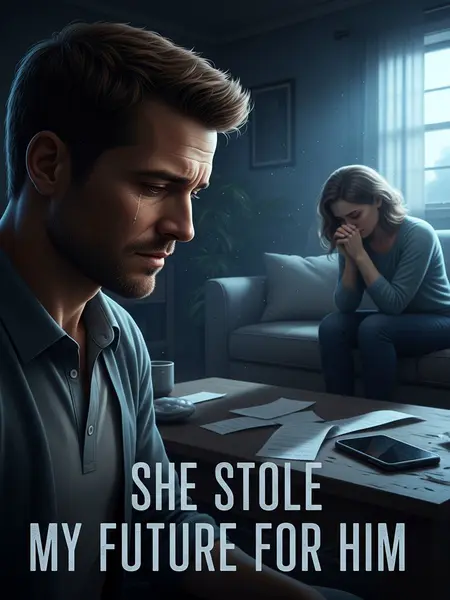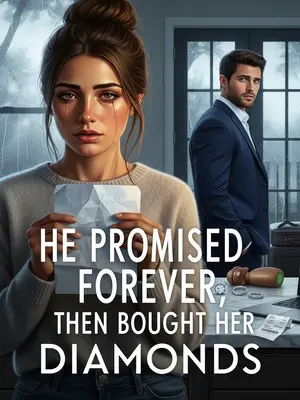Chapter 1: The Wedding Bombshell
The year after my dad died of lung cancer, my mom took off and remarried, leaving my sister and me behind.
The memory of those months after Dad’s funeral still lingers—quiet dinners, the house echoing with silence, the way Mom couldn’t even look at Dad’s empty chair. Then, just when I thought we might start to heal, she was gone too. Not gone gone, but… it sure felt like it. She packed her bags and left to start over, chasing a second chance none of us saw coming.
My stepdad, Roger Whitlock, is the last of his family line, and unbelievably, my mom wants to give him a son to carry on the Whitlock name.
I remember the first time she brought up the Whitlocks’ family history. She sounded proud, but also kind of nervous, like she wasn’t sure she believed it herself. Roger’s family had this faded wall of portraits in his living room—black-and-white faces, some stern, some hopeful, all leading down to him. I guess Mom saw it as her job to keep that line going, but to me, it sounded like something out of an old Southern novel, not real life in Ohio.
I tried to talk her out of it, but she secretly drained our family’s savings for IVF.
It was like a punch to the gut. I’d always believed our family’s little nest egg was safe, tucked away for emergencies—never in a million years did I think Mom would touch it, let alone for something like this. The betrayal stung in a way that’s hard to put into words. Like finding out your favorite childhood memory was a lie.
What she didn’t realize was that money was our only hope of having kids.
That savings account was more than just numbers on a screen—it was hope. It was everything. It was all the whispered late-night plans my wife and I made, the names we’d doodled on notepads, the future we clung to after every doctor’s appointment. Without it, that future felt like it was slipping through our fingers.
At my mom and Roger’s wedding, the atmosphere was warm and lively. It felt almost normal, for once. She wore a bright red dress, arm in arm with Roger, beaming as she toasted each table.
The reception hall was decked out in string lights and fake roses—the kind you buy in bulk at Walmart—but somehow it looked almost magical. Mom’s laugh rang out over the clatter of forks and the hum of conversation. Roger, in his navy suit, looked like he’d just won the lottery. People were smiling, clinking glasses, the air thick with the scent of roast beef and buttered rolls. For a moment, it almost felt like we were a regular family again.
Then she said something that stopped everyone cold. It hit the room like a bolt of lightning, freezing the mood in an instant.
It was like the DJ had pulled the plug mid-song. Every fork paused halfway to a mouth. You could hear the air conditioner click on in the silence.
“To give my husband, Roger Whitlock, a son to carry on his family name, I’ve decided to have a baby boy for him.”
Her voice was sweet, a little shy, and full of anticipation.
She clutched her champagne flute with both hands, her face went pink. There was a little quiver in her voice, like she was nervous but proud. For a split second, she looked younger, almost girlish. Then the words hung there, and the moment stretched out.
As soon as she finished, the whole table fell silent. I wished I could disappear. Relatives and friends exchanged glances.
You could practically see the gears turning in people’s heads. Cousin Mark raised an eyebrow. Aunt Jan pursed her lips, her gaze flicking from Mom to me. Someone at the back let out a low whistle, barely holding it together.
I could feel the tension crackling. Before long, the whispers started.
“Linda must be fifty by now, right? Isn’t she about to hit menopause? Can she even have kids?”
“Her son’s already married, and now the mom wants a third child? The son will be the same age as the grandson.”
“She must’ve been sweet-talked by a man. Having a baby at her age is risking her life.”
The gossip crawled over my skin.
It was like a thousand tiny needles. My palms went slick. I could feel my heart thudding in my ears, the way it does when you’re about to say something you can’t take back.
Everyone was looking at me now—some surprised, some curious, most with that indescribable amusement.
It was as if I’d become the punchline of a joke I didn’t understand. A couple of my old high school friends were there, and I could see them exchanging looks, trying not to laugh. My face burned. I wished I could melt into the floor.
Honestly, I felt like I was about to crawl out of my skin, perched on pins and needles. Suddenly, I shot to my feet.
My chair scraped against the linoleum, way too loud. I could barely breathe, my hands shaking as I stood up. It was like the whole room was waiting to see what I’d do next. All eyes on me.
“Mom, what are you talking about?”
The words came out louder than I meant. I winced. For a moment, I felt like a little kid again, scolded in front of the whole family, but this time it was me calling her out.
I tried to play it off, forcing myself to stay calm. “Sorry, everyone. My mom’s had a few too many drinks on her big day.”
“She can’t really hold her liquor, so now she’s just talking nonsense. Please, don’t mind her—just enjoy the party.”
I tried to keep my tone light. I even cracked a smile, but my voice trembled. I caught the eye of the caterer, who gave me a sympathetic shrug. Some folks chuckled awkwardly and reached for their drinks, grateful for the excuse to change the subject.
As soon as I finished, I grabbed my mom, trying to get her out of there.
I reached for her arm, my grip gentle but firm, hoping to get us out before things blew up. I could feel the heat of everyone’s gaze following us, the tension in the air thick enough to cut with a butter knife.
She jerked her arm away, shooting me a look.
She yanked her arm free, her lips twisting into a half-smile that flickered with something sharp, like she was daring me to push her further. “Don’t be ridiculous,” she said, loud enough for everyone to hear. Her cheeks were still red, but now with anger.
“I’m not drunk! What’s wrong with you, acting like this?” she protested.
She glared at me, her voice sharp. It stung. I could tell she was embarrassed, but she wasn’t about to back down in front of a crowd. I felt the weight of her pride pressing down on both of us.
I took a deep breath and tightened my grip, leading her away from the reception hall. I didn’t let go.
I leaned in close and whispered, “Please, Mom, let’s talk outside.” I was barely holding it together. She huffed but didn’t resist as I steered her through the maze of tables, past half-eaten cake and half-hearted applause.
The room went quiet behind us. Dozens of eyes followed our backs as we left, like they couldn’t wait to see how this drama would end.
It was the longest walk of my life. Every step felt like a spotlight was following us, people craning their necks to catch one last look. Even the DJ paused the music, letting the silence settle like dust.
My stepdad, Roger, had been all smiles, moved by my mom’s heartfelt words. But now, his smile froze. He watched helplessly as I led my mom out, his eyes full of confusion and blame.
Roger’s jaw worked silently. He clenched his fists. He looked like a man who’d just watched his lottery ticket blow away in the wind. His hands twisted in his lap, eyes darting between me and the empty space where Mom had stood. I could almost hear the gears grinding in his head.
As soon as we got home, my mom yanked her hand free and rounded on me. She was livid.
She slammed the front door behind us, her face red, chest heaving. The house felt colder, the walls closing in, like the tension was a storm about to break.
“What’s wrong with you today? How could you say those things in front of everyone and make us a laughingstock?”
She jabbed a finger at me, her voice rising. I braced myself. I could see the hurt behind her anger, but she masked it with indignation. The living room, cluttered with wedding gifts and unopened boxes, suddenly felt claustrophobic.
I swallowed my anger and stared at her. My voice shook with frustration.
I clenched my fists, trying to keep my cool. “Mom, you put me on the spot. What was I supposed to do?” My words came out tight, every syllable a struggle.
“Who’s really making us a laughingstock here? Mom, you’re fifty—how can you still have a baby?”
I couldn’t help it—my voice cracked. I tried to soften it, but the disbelief was too strong. The absurdity of it all was overwhelming.
“Something this big, you didn’t even talk to me about it first, just blurted it out in public. Are you out of your mind?”
I stared at her, waiting for an answer that made sense. Nothing. I felt a defeated chill in my chest.
She looked ready to snap.
She snapped at me, her voice sharp:
“I married Roger, so I have to give him a son to carry on his name. Isn’t that what a wife’s supposed to do?”
She spat out the words like a challenge. The tension between us was electric. I could barely breathe.
I closed my eyes and took a deep breath, trying to calm myself.
I counted to five, then ten, willing myself not to shout. My jaw ached from clenching it so hard.
“I keep telling you—you and Roger are getting older. I’ll take care of you both when you’re old.”
I wanted to sound reassuring, but my voice came out brittle. I meant every word, but she just shook her head, unconvinced.
Her eyes darted away, and she mumbled, “Roger’s the only son in three generations. You’re not even a Whitlock by blood. If I don’t give him a son, his line will end…”
She stared at the floor, twisting her wedding ring. I could tell she believed every word, even if it sounded ridiculous to me. The pressure she felt was real, even if it came from ghosts and traditions I couldn’t see.
Hearing this, I was floored. I laughed—it was just too absurd.
I let out a bitter laugh, running a hand through my hair. “Mom, this isn’t the 1800s. Nobody cares about family records anymore.” But I could see the fear in her eyes, the way old stories still haunted her.
I tried again to reason with her. “Do you know how dangerous it is to have a baby at your age?”
I tried to sound calm, hoping logic would get through. “You could get seriously hurt. The risks are huge.” I searched her face for any sign she was listening.
She just shrugged. “So what if I’m fifty? With today’s medical technology, plenty of women have babies at sixty.”
She lifted her chin, defiant. “I read about it online. People are doing it all the time now.”
She paused, then added, “And if I can’t do it naturally, there’s always IVF, right?”
She said it like IVF was as simple as ordering takeout. The words made my stomach twist.
The word “IVF” hit me like a slap.
I felt my face flush hot, then cold. It was like she’d reached into my chest and squeezed my heart. My hands started to shake.
I couldn’t hold it back anymore. The anger I’d been swallowing flared.
I clenched my jaw, fighting to keep my voice steady. My vision blurred with rage and disbelief.
I stared at her, furious. I couldn’t believe it. “You’re only thinking about him. Have you even considered me and my sister? My sister’s still in school. I’m married and can’t even afford a house or a car. Do you know how much it costs to raise a child these days?”
The words tumbled out, my frustration boiling over. I could feel my pulse pounding in my temples. The unfairness of it all was suffocating.
But her eyes changed, filling with tears as if she’d finally proved her point.
She drew herself up, her tears glistening but her tone icy. She was ready for a fight.
“You’re just hung up on the money your dad left behind, aren’t you? Have you ever thought about how hard it is for me? I married into Roger’s family. If I don’t give him a son, how can I hold my head up?”
She threw the words at me like darts. “People talk, Ethan. They always have.”
“Without a son, your stepdad Roger will always be looked down on. The two of us will be talked about for the rest of our lives.”
She wiped her eyes with the back of her hand, sniffling. The shame she felt was real, even if I thought it was misplaced.
I barked out a harsh, sarcastic laugh.
“Mom, who cares what people say? You already have a son and a daughter. Why risk your life to have a child for someone else? Have you lost your mind?”
I paused, watching her chest heave with anger, and decided to lay it all out. My heart hammered in my chest.
I took a step closer, lowering my voice. “Roger has no money and no skills. He’s over fifty and still couldn’t find a wife. I only agreed to your remarriage because I wanted you to have some company in your old age. Now I see that was a mistake.”
I let the words hang in the air, heavy and final. I could see the shock register on her face, but I pressed on.
“You just got married and he’s already talking you into having a kid, buying this and that. Sooner or later, he’ll bleed us dry, taking everything Dad left behind. What would Dad say if he knew?”
I saw her flinch, her hands trembling. Bringing up Dad always hit her hardest. I hated myself for using it, but I was desperate to make her see reason.
That hit a nerve. Tears welled up in her eyes.
She bit her lip, fighting not to cry. For a moment, she looked like the mom I remembered from childhood—vulnerable, overwhelmed.
She hit my shoulder, not hard enough to hurt. “How can you talk to me like this? Was it easy raising you and your sister? You’re married now, your sister’s grown up. Can’t I choose the life I want?”
She swung at me, not to hurt, but out of pure frustration. Her voice shook with every word. I rubbed my shoulder, but I didn’t back away.
I replied coldly, “You know you’re walking into a trap, but you just keep going. If he had money, Roger would’ve found a young, pretty woman to have his son. Would he have married you?”
My words were icy, but I meant them. I watched as she recoiled, her pride wounded.
She grew even more agitated. She paced the room, hands slicing the air. “All you talk about is money. What am I supposed to do if you can’t afford a house or a car? Your father only left this much in savings.”
“I already told you, we’ll use your sister’s wedding fund for your down payment. What more do you want?”
She crossed her arms, defiant.
I just couldn’t reason with her. I felt so tired, like all the fight had drained out of me.
“You’re completely obsessed, Mom. Look at yourself—are you even living for yourself anymore? Can’t you wake up?”
She wouldn’t listen, glaring at me.
She spat the words at me, her voice trembling. “I’m not the one who’s lost it. You’re just too selfish. You want me to be your workhorse for life, saving money for your house and car, taking care of your wife and kids, bleeding me dry.”
My heart twisted with disappointment.
I looked at her, really looked, and saw the fear, the loneliness, the desperation. It hurt more than I wanted to admit.
After a moment of silence, I said calmly but firmly, “No matter what, I can’t agree to you having a child for him. If you insist, then just pretend I’m not your son anymore.”
My voice was steady, but inside I was falling apart. I meant it, but I hated that I had to say it. The words echoed in the quiet room, final and cold.
My words left her speechless. She averted her eyes and fell silent.
She turned away, shoulders slumped, staring out the window at nothing. For once, she didn’t have a comeback. The silence between us was thick, almost suffocating.













